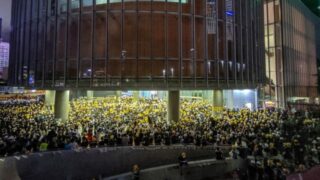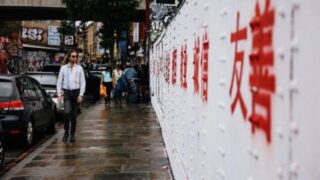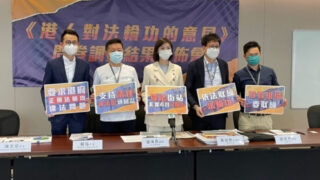It is now crystal clear that Beijing would never allow a free and honest vote.
by Edward Chin


I could still remember the day of July 1st, 2017, when Carrie Lam took over as the Chief Executive of the Hong Kong SAR. She was sworn in by President Xi Jinping in Hong Kong, whilst the city also marked the 20th year of the handover at the time. Rewind the clock back a few months earlier to October of 2016. Retired judge Woo Kwok-Hing was the first to announce to contest for the Chief Executive race in October of 2016; then the former Financial Secretary John Tsang and former Chief Secretary Carrie Lam also made their intention to run for election, all at around the same time.
A former judge was never viewed as a strong contender for Hong Kong’s top job. After all, Beijing wants absolute obedience and loyalty, not impartiality in upholding the law. Let us go back in time even further, from colonial British Hong Kong to Communist Hong Kong of 1997. During the time of the first Chief Executive race for the HK SAR (Hong Kong Special Administrative Region), then Chief Justice Ti-Liang Yang was a contender, but ended up getting 10.55% of the electoral vote. For retired judge Woo who entered the 2017 HK Chief Executive race, he ended up getting 1.81% of the electoral vote, a weak number by any standard. That said, it has been good to have someone from the legal profession in joining the race. Though a side show, and the intention was not really the wining, it showed back then a “pretense of diversity” of Hong Kong, even though all who enters the race needs the blessings from Beijing to win.
As we all know from before, the top job of the HK SAR (Hong Kong Special Administrative Region), the Chief Executive was selected by then a 1,200-member Election Committee with a five year term; the Election Committee was divided into many subsectors, not representative of a democratic election like that of the free world. It is also quite different from the one person, one vote, without pre-screening model that Hong Kong people have long hoped for but never achieved. A lot of the 1,200 Election Committee members were “privileged” per se, they are either members of the NPCSC (National People Congress Standing Committee), or members of the CPPCC (Chinese People’s Political Consultative Conference), loyalists that most of the time would support the policy making of the Hong Kong Government.
Fast forward to 2021. The Election Committee for the next chief executive is now 1,500 member strong, and they have to be “real patriots” of the CCP (Chinese Communist Party) in order to qualify. They also have to be vetted by a special committee, just to make sure the Election Committee members are patriotic to Communist China. Carrie Lam has been the Chief Executive of Hong Kong for the past 4 years now, but it is up to the Beijing masters up north to make the call for the “top candidate” for the election.
The HK Chief Executive race, after all these years since the Handover of 1997, still remains a small circle group with no merits. It has no meaning at all, when the puppet Hong Kong government just arbitrarily put all opposition voices behind bars, whenever Hong Kong people try to run for true election. The so-called “opposition voices” ̶ from the founder of Apple Daily Jimmy Lai to constitutional legal expert Professor Benny Tai, and youth activist Joshua Wong could be the best contender for HK SAR Chief Executive, Secretary for Justice and perhaps a newly created post of Youth Minister respectively. That said, the harsh reality is, the totalitarian regime wants to put these three Hong Kong heroes and the opposition leaders behind bars indefinitely.
I was idealistic to draft up a letter to President Xi with my team, to talk about the “10 Ten Requests to the Communist Party of China from the People in Hong Kong (Finance and Banking Sector)” (香港人對中國共產黨的十個訴求(金融人篇) back a few years ago. That was even before the Umbrella Movement of 2014. One of the requests is this:
Establish a system of genuine universal suffrage that conforms to international standards and recognize that this is the political freedom that all the people in Hong Kong seek. To implement the principle of “one country, two systems,” the Central Government must accord the Hong Kong Government with high degree of autonomy and recognize its legitimacy (香港早已具備推行全面普選的條件,訂立一個符合國際標準的真普選制度,選出一個有認受性的政府,才能搞好一國兩制下半場).
And the interpretation of this Clause is as follows:
We sincerely call on the central government leaders, in accordance with Article 39 and 45 of the Basic Law, to establish a universal and equal electoral system that conforms to international standards and is to be used for electing the Chief Executive from 2017 onwards, in addition to directly electing all seats in the Legislative Council in 2020 by completely abolishing functional constituencies. All framework and operation of electing and nominating the Hong Kong Chief Executive are electoral matters internal to the Hong Kong Special Administrative Region (SAR), not China’s national election, and thus the central government should delegate its power to the SAR and serve only to appoint the Chief Executive-elect as stipulated in the Basic Law.
I talked reasoning then to Beijing, and I still do. But we all know the harsh reality. To look at things more realistically, Hong Kong’s electoral system has turned totally undemocratic, and the once famed financial center has turned into a city of desperation. That feeling seem to grow by the day. To look beyond election, the inevitable collapse of this city’s freedoms has been most chilling. It is a harsh reality that Hong Kong has not only lost all meaningful elections, but its autonomy as well. What comes next for Hong Kong is the further erosion of its freedom, loss of free speech and even persecution. Hong Kong is in a severe storm, and we have to find our ways of survival.









